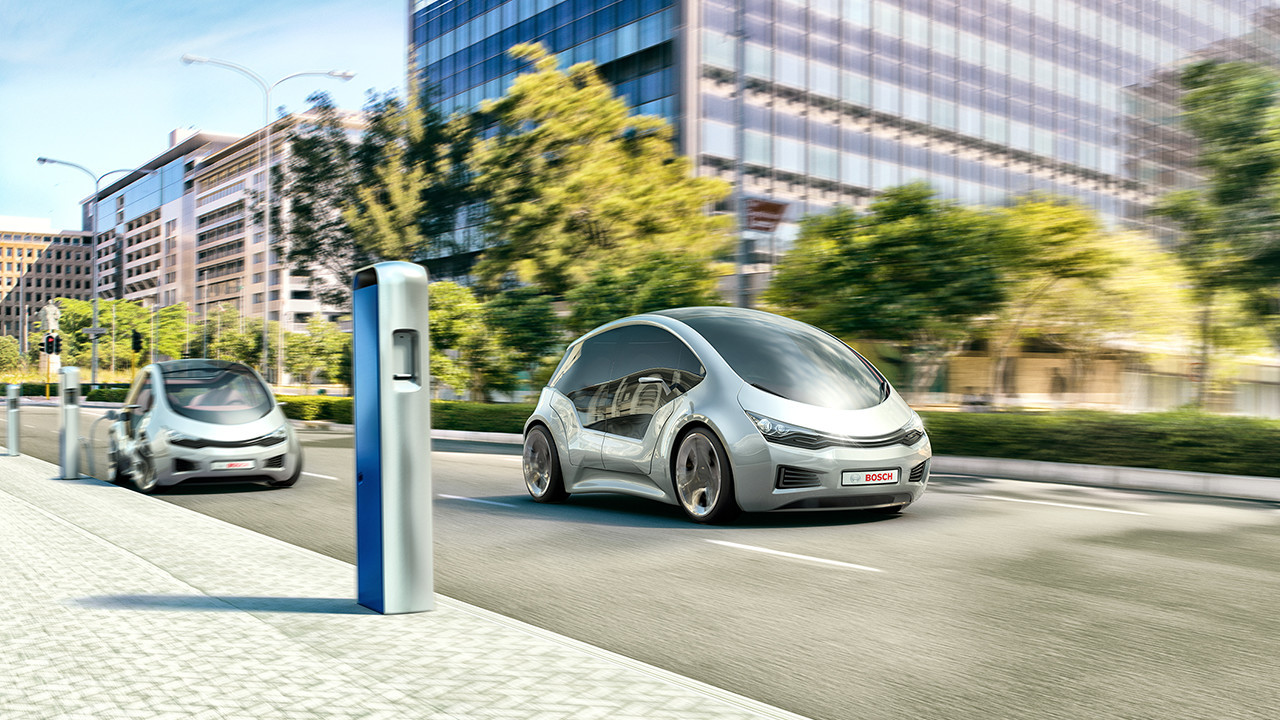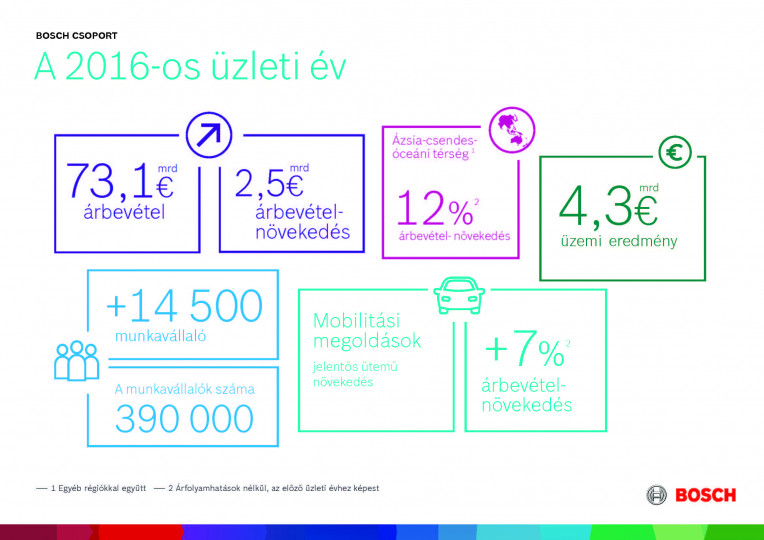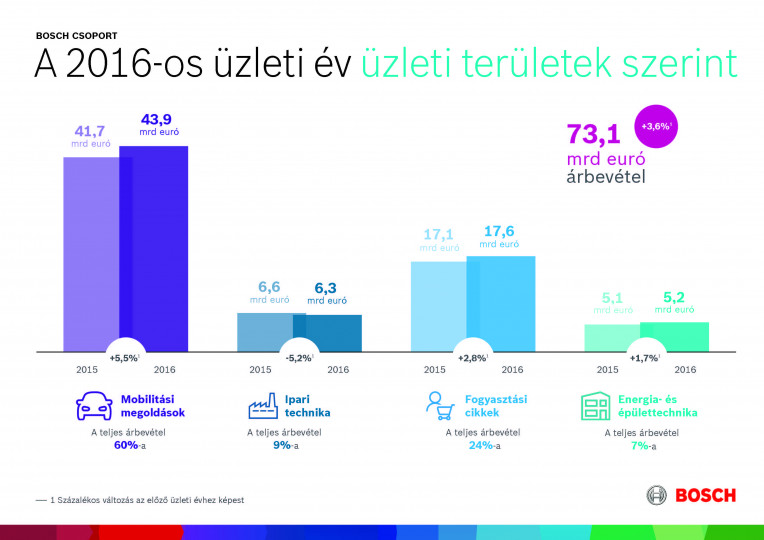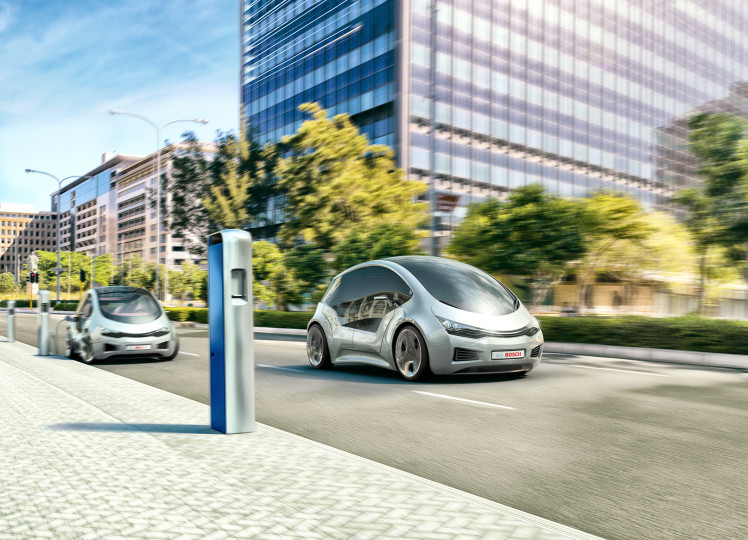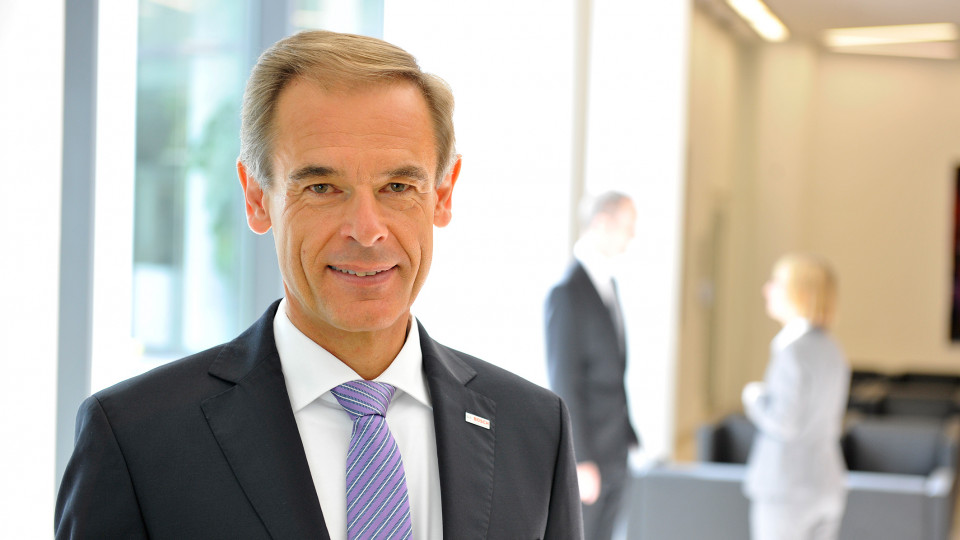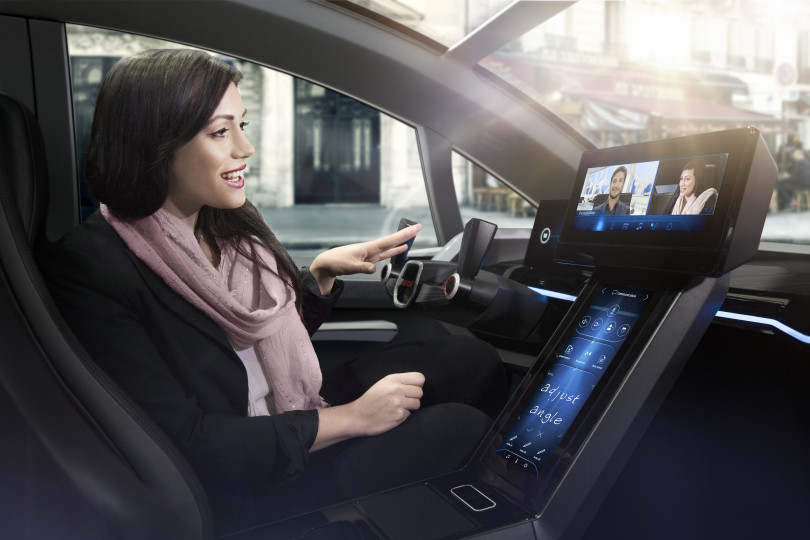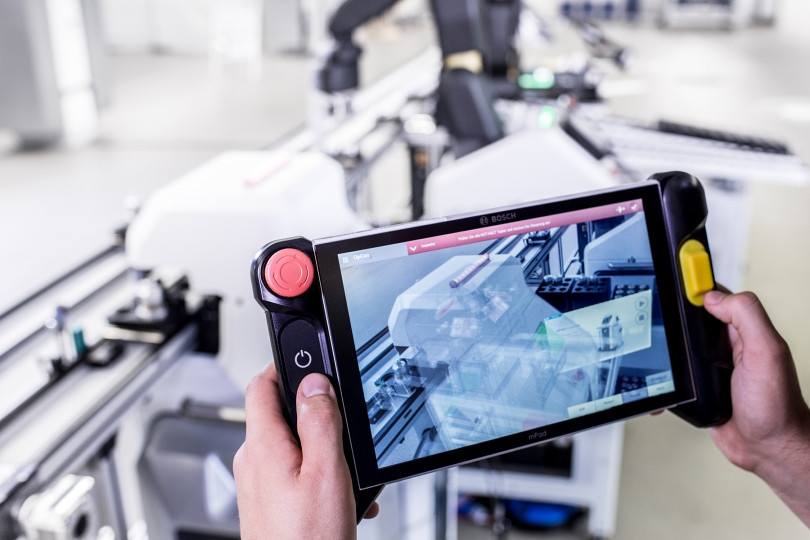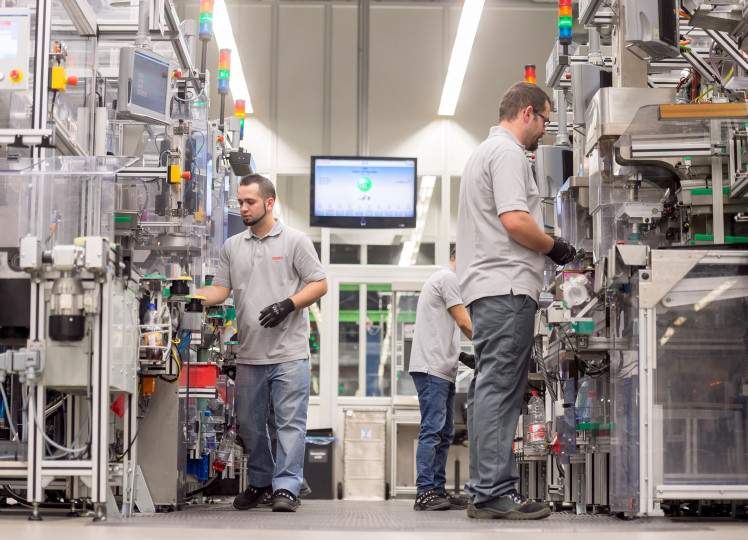Stuttgart and Renningen, Germany – The Bosch Group has made a good start to the new business year. Sales of the supplier of technology and services rose some 12 percent in the first quarter, and 11 percent after adjusting for exchange rates. All business sectors and regions picked up in the first three months of 2017, some significantly so. For the current year, in light of a subdued economic outlook and geopolitical uncertainty, Bosch aims to achieve sales growth of between three and five percent. And despite still heavy upfront investments in safeguarding the company’s future, result is set to rise. “Business success today gives us the leeway to shape tomorrow’s world,” said Dr. Volkmar Denner, the chairman of the Bosch board of management, at the annual press conference at Bosch’s research campus in Renningen. “Take our existing business forward, open up new areas of business, occupy a technologically leading position – that is our strategy for the transformation process.” The focal points of this transformation are changes in the mobility sphere and IoT connectivity. “As an innovation leader, we are shaping and driving transformation,” Denner added.
Business year 2016: upfront investments for the future on a record level
In 2016, Bosch Group sales rose to 73.1 billion euros. This is equivalent to 3.6 percent growth, or 5.5 percent after adjusting for exchange-rate effects. Negative effects from exchange rates came to some 1.3 billion euros last year. Earnings from operations before interest and taxes (operative EBIT) came to 4.3 billion euros, and the EBIT margin from operations to 5.8 percent. The development in result in 2016 reflects the heavy upfront investments in securing the company’s future. Last year, Bosch raised its research and development spending by just under 10 percent to 7 billion euros. As Prof. Stefan Asenkerschbaumer, the CFO and deputy chairman of the board of management, explained: “Bosch has to make considerable upfront investments in the transformation process, and at the same time safeguard high profitability over the long term.” EBIT was impacted by negative extraordinary effects in 2016, and came to 3.3 billion euros.
New conceptions for mobility: zero emissions, zero stress, zero accidents
The mobility sphere is on the brink of considerable upheaval. “Bosch will make a new kind of mobility possible, a mobility that is without emissions, without stress, and without accidents. It’s no longer just a case of making better cars. We have to reinvent mobility,” Denner said. He added that improving air quality in cities, where 70 percent of the global population will live by 2050, is a task that industry, politics, and society must tackle together. Referring to the current debate about driving bans for diesel vehicles, the Bosch CEO stressed that both targets and policies for better air quality have to be technology-neutral. “The creativity of our engineers must not be restricted to a particular technology by politics,” Denner said. The Bosch CEO believes that further improvements to the internal-combustion engine offer huge potential. The RDE (real driving emissions) measuring procedure that will be valid from fall 2017 will help further reduce nitrogen-oxide emissions from vehicles. Bosch is currently working on some 300 RDE development projects. For gasoline-powered vehicles, the company has long championed the widespread use of particulate filters. Moreover, applying connectivity to transport can also help improve air quality. For the Greater Stuttgart area, Bosch has developed an assistant for multimodal transport. And from 2018, the community-based parking service developed by Bosch will feature in production vehicles.
The electrification of mobility: a combination of electricity and fuel
Bosch is also investing a lot of effort in taking electric driving forward. A new operating unit for electromobility will bring together all the company’s activities in this area. In addition to the billions invested in improving internal-combustion engines, the company is investing some 400 million euros each year toward achieving a breakthrough in electromobility. Most of this goes into battery research and development. Bosch is researching both current and future battery-cell technologies. The company has already won more than 30 electromobility-related orders. In 2016, it won a further 11 in China alone, the world’s largest market for electromobility. From the start of 2018, the new Bosch Powertrain Solutions division and its 88,000 associates will offer all powertrain technologies from a single source. “Whether fuel or electricity, Bosch will drive the powertrain in the future as well. For our customers, we are and want to be the number-one partner for engineering and technology,” Denner said.
The automation of mobility: business success
When it comes to automated driving as well, Bosch can point to technological progress and business success. With driver assistance systems, the company generated sales of more than a billion euros for the first time in 2016, as well as winning orders worth 3.5 billion euros. All in all, Bosch intends to grow faster than the market with driver assistance systems in 2017 – a market that is forecast to grow 30 percent. Some 3,000 Bosch engineers are now working on automated driving, 500 more than in the previous year. Together with Daimler, Bosch is working to advance fully automated and driverless vehicles for city streets. The aim is for vehicles to drive completely autonomously in cities by the start of the next decade. One of the key components for this is the Bosch AI onboard computer. Its artificial intelligence makes it the brain of the self-driving car. Before the decade is out, the company will have created a highly precise digital map on the basis of radar signals. Such a map is a key requirement for automated driving. In developing partnerships with Vodafone, Telekom, Huawei, and Nokia, moreover, Bosch is working on the infrastructure for automated and connected traffic. For example, it is carrying out tests to find reliable vehicle-to-vehicle wireless communication.
Connected mobility: the mobile butler
This year will see the launch of the Bosch Automotive Cloud Suite, a new platform for mobility services such as the wrong-way driver alert, predictive diagnosis, connected parking, and personal assistants. “The Bosch Automotive Cloud Suite is the key technological element for services related to the connected vehicle. We will use it to connect drivers, cars, automakers, and providers of other mobility services,” Denner said. The Bosch Automotive Cloud Suite combines the company’s automotive and IT expertise. PwC expects the global market for connected mobility to grow by nearly 25 percent annually in the years up to 2022, while Gartner estimates that 250 million connected vehicles will be driving on the world’s roads by 2020.
New perceptions of technology: intelligent and emotive
Also by 2020, Bosch estimates that the global volume of the IoT market will grow 35 percent annually to 250 billion dollars. In 2016, the company already sold 27 million web-enabled products. By 2020, all its new electronic products will feature connectivity. And in the future, services are also to be offered to accompany each product. They key to this is artificial intelligence (AI). Ten years from now, nearly every Bosch product will be developed, manufactured, or equipped with artificial intelligence. Over the next five years, Bosch will be investing 300 million euros in its own center for artificial intelligence. And in the German state of Baden-Württemberg, Bosch is helping set up “Cyber Valley.” This alliance of politicians, businesspeople, and scientists is intended to provide a boost for AI research. Together with the University of Amsterdam, Bosch is operating Delta Lab, a research laboratory for deep learning. To quote Volkmar Denner: “Artificial intelligence will make connectivity personal, something that can be experienced on an emotive level. Digital assistants will become increasingly clever, and relieve users of daily chores.” Tractica forecasts that the number of people using digital assistants will triple to more than 1.5 billion by the start of the next decade.
The business year 2016 by region
In Europe, the Bosch Group generated sales of 38.6 billion euros in 2016. Year on year, revenue increased 3.4 percent, or 4.8 percent after adjusting for exchange-rate effects. In 2016, these effects were unusually high, not least due to the depreciation of sterling. Following a very strong previous year, Bosch Group sales in North America declined 2.2 percent to 12.3 billion euros last year, or by 1.8 percent adjusted for exchange-rate effects. After years of declining Bosch Group sales in South America, the exchange rate-adjusted figures disclosed a 2.4 percent rise. In nominal terms, sales fell 5 percent to 1.4 billion euros. In Asia Pacific, Bosch recorded a hefty 8.3 percent increase in sales to 20.8 billion euros (exchange rate-adjusted 12 percent). Bosch now generates nearly 30 percent of its sales in Asia Pacific.
The business year 2016 by business sector
Of the company’s four business sectors, Mobility Solutions grew the strongest in 2016. Sales rose 5.5 percent (6.9 percent after adjusting for exchange-rate effects) to 43.9 billion euros. The sector’s margin from operations came to 6.0 percent. The Industrial Technology business sector, and especially the Drive and Control Technology division, continued to face a difficult market environment in 2016. Sales fell 5.2 percent (4.2 percent after adjusting for exchange-rate effects) to 6.3 billion euros. When adjusted for the consolidation effects resulting from the sale of its large gearboxes unit, the fall in sales was only 1.5 percent. On an encouraging note, the business sector returned to profitability. Negative exchange-rate effects were especially in evidence in the sales disclosed by the Consumer Goods business sector. After adjusting for these effects, the business sector’s sales grew 5.7 percent. Nominal sales growth was 2.6 percent, to 17.6 billion euros. The business sector’s margin from operations rose one percentage point, to 8.2 percent. The Energy and Building Technology business sector achieved sales of 5.2 billion euros in 2016. Here too, exchange rates negatively affected sales. Adjusted for these effects, sales grew 4.5 percent. The nominal figure was 1.7 percent. The business sector’s margin came to 4.3 percent in 2016.
Headcount: considerable need for IT and software-related personnel
As of December 31, 2016, the Bosch Group employed some 390,000 associates worldwide. Headcount increased by 14,500 last year. Regionally, the workforce structure remained largely unchanged. The number of associates in Germany rose by 2,000 to 134,000. Most of the remaining headcount increase was in Asia and North America. The company currently has considerable staffing requirements for specialists and executives, especially with software and IT expertise. Even now, Bosch employs more than 20,000 software engineers, just under 4,000 of them for the internet of things alone.
Mónika Hack
+36 70 510 5516
The Bosch Group is a leading global supplier of technology and services. It employs roughly 390,000 associates worldwide (as of December 31, 2016). The company generated sales of 73.1 billion euros in 2016. Its operations are divided into four business sectors: Mobility Solutions, Industrial Technology, Consumer Goods, and Energy and Building Technology. As a leading IoT company, Bosch offers innovative solutions for smart homes, smart cities, connected mobility, and connected manufacturing. It uses its expertise in sensor technology, software, and services, as well as its own IoT cloud, to offer its customers connected, cross-domain solutions from a single source. The Bosch Group’s strategic objective is to deliver innovations for a connected life. Bosch improves quality of life worldwide with products and services that are innovative and spark enthusiasm. In short, Bosch creates technology that is “Invented for life.” The Bosch Group comprises Robert Bosch GmbH and its roughly 440 subsidiaries and regional companies in some 60 countries. Including sales and service partners, Bosch’s global manufacturing and sales network covers nearly every country in the world. The basis for the company’s future growth is its innovative strength. At 120 locations across the globe, Bosch employs some 59,000 associates in research and development.
The company was set up in Stuttgart in 1886 by Robert Bosch (1861-1942) as “Workshop for Precision Mechanics and Electrical Engineering.” The special ownership structure of Robert Bosch GmbH guarantees the entrepreneurial freedom of the Bosch Group, making it possible for the company to plan over the long term and to undertake significant up-front investments in the safeguarding of its future. Ninety-two percent of the share capital of Robert Bosch GmbH is held by Robert Bosch Stiftung GmbH, a charitable foundation. The majority of voting rights are held by Robert Bosch Industrietreuhand KG, an industrial trust. The entrepreneurial ownership functions are carried out by the trust. The remaining shares are held by the Bosch family and by Robert Bosch GmbH.
Additional information is available online at www.bosch.com, www.iot.bosch.com, www.bosch-press.com, www.twitter.com/BoschPresse, www.bosch.hu

